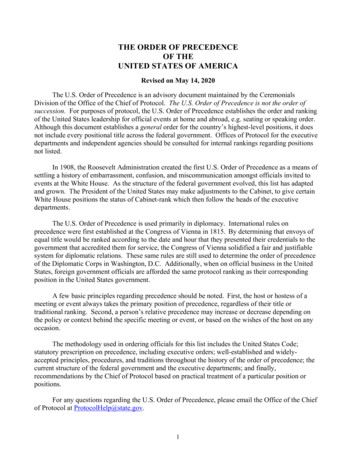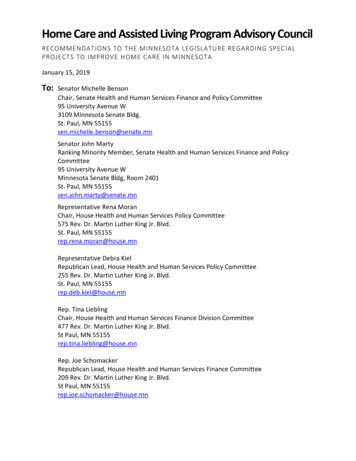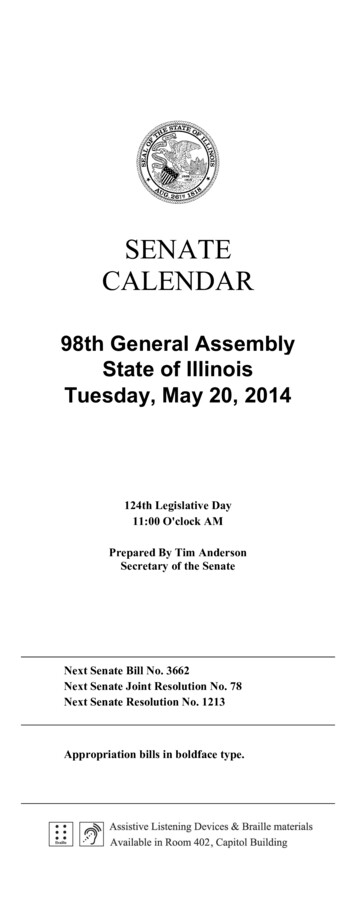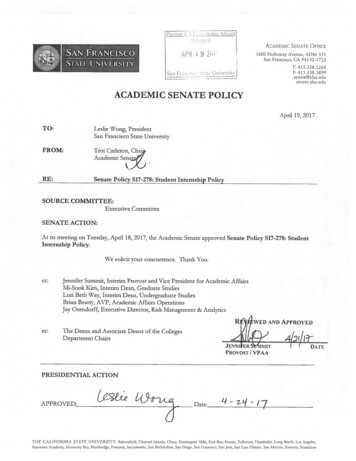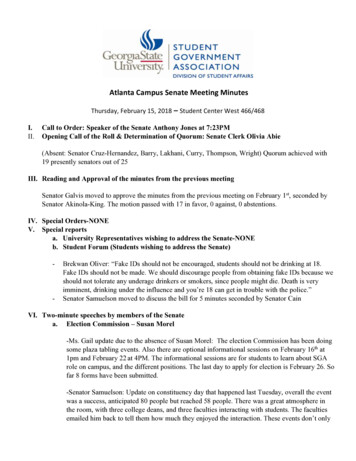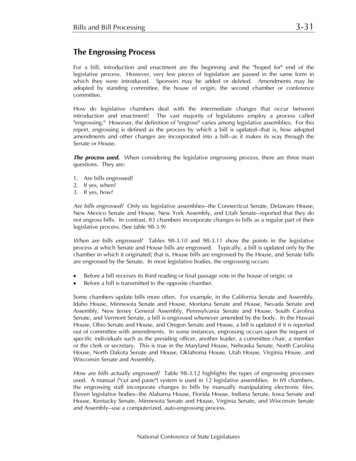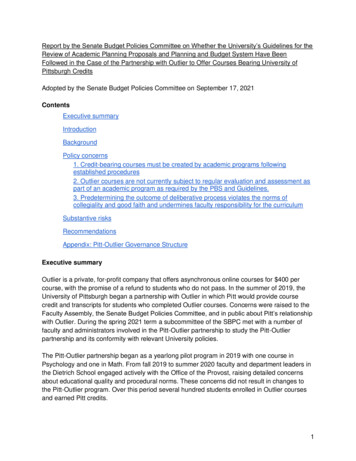
Transcription
Report by the Senate Budget Policies Committee on Whether the University’s Guidelines for theReview of Academic Planning Proposals and Planning and Budget System Have BeenFollowed in the Case of the Partnership with Outlier to Offer Courses Bearing University ofPittsburgh CreditsAdopted by the Senate Budget Policies Committee on September 17, 2021ContentsExecutive summaryIntroductionBackgroundPolicy concerns1. Credit-bearing courses must be created by academic programs followingestablished procedures2. Outlier courses are not currently subject to regular evaluation and assessment aspart of an academic program as required by the PBS and Guidelines.3. Predetermining the outcome of deliberative process violates the norms ofcollegiality and good faith and undermines faculty responsibility for the curriculumSubstantive risksRecommendationsAppendix: Pitt-Outlier Governance StructureExecutive summaryOutlier is a private, for-profit company that offers asynchronous online courses for 400 percourse, with the promise of a refund to students who do not pass. In the summer of 2019, theUniversity of Pittsburgh began a partnership with Outlier in which Pitt would provide coursecredit and transcripts for students who completed Outlier courses. Concerns were raised to theFaculty Assembly, the Senate Budget Policies Committee, and in public about Pitt’s relationshipwith Outlier. During the spring 2021 term a subcommittee of the SBPC met with a number offaculty and administrators involved in the Pitt-Outlier partnership to study the Pitt-Outlierpartnership and its conformity with relevant University policies.The Pitt-Outlier partnership began as a yearlong pilot program in 2019 with one course inPsychology and one in Math. From fall 2019 to summer 2020 faculty and department leaders inthe Dietrich School engaged actively with the Office of the Provost, raising detailed concernsabout educational quality and procedural norms. These concerns did not result in changes tothe Pitt-Outlier program. Over this period several hundred students enrolled in Outlier coursesand earned Pitt credits.1
In fall 2020 the Provost’s office invited the regional campuses to participate in the Outlierprogram, and the Pitt-Johnstown administration accepted. In October and early November 2020Pitt-Johnstown faculty were informed of the Outlier partnership and invited to at least twomeetings hosted by the Pitt-Johnstown faculty senate to discuss the Outlier partnership but didnot vote on the partnership or otherwise contribute to the decision. Pitt-Johnstown faculty didnot have access to data from the pilot year, and they did not have access to information aboutthe yearlong process that had taken place in the Dietrich School, in which faculty anddepartmental leaders deliberated and raised substantive and procedural concerns about theOutlier program. By November 19, 2020, Pitt-Johnstown had signed a five-year contract withOutlier.The report finds that Pitt’s well-established shared governance policies and norms requirespecific procedures to be followed in the creation and evaluation of new courses, and that theseprocedures were not followed in the case of the partnership with Outlier. In particular, Pittpolicies primarily work through academic programs, which are the units to which requirementsfor planning and assessment apply. The Outlier program bypasses the academic programstructure, raising significant concerns.The report identifies three key concerns raised by the Pitt-Outlier partnership:1. The Planning and Budgeting System and the Guidelines for the Review of AcademicPlanning Proposals require new credit-bearing courses to be created as part of existingacademic programs, which was not followed in this case.2. Outlier courses are not currently subject to regular evaluation and assessment as part ofan academic program as required by the PBS and Guidelines.3. Predetermining the outcome of deliberative processes, as this report finds, violatesimportant norms of collegiality and good faith and undermines faculty responsibility forthe curriculum.The report also identifies several substantive risks raised by these procedural problems:reputational harm; misinforming students and placing unreasonable pressure on Pitt programs;accreditation; educational quality; conflicts of interest; shared governance; and unequal statusof regional campus faculty.The report makes four recommendations in light of these findings:1. Minor revision to the Guidelines to clarify that individual courses are always created aspart of academic programs.2. Acknowledgement of the procedural errors by the administration and commitment toprioritize faculty responsibility for the curriculum.3. Affirmation by the administration that ongoing deliberations with faculty in one unitshould be respected, and the administration should not predetermine the outcome ofdeliberative processes.2
4. Changes to the Pitt-Outlier program to conform with University policies and normsgoverning course development and assessment.Norms of shared governance are not satisfied by ad hoc consultation with faculty inunstructured and unpredictable formats. Instead, shared governance is achieved by consistentand predictable application of procedures defined transparently and in accordance with wellestablished policies.IntroductionThe Planning and Budget System (PBS) charges the Senate Budget Policies Committee(SBPC) with the responsibility of reviewing whether PBS processes are followed, and whetherall constituencies involved are provided adequate opportunities to participate in the process andto be informed of its outcomes. As part of the PBS, the Guidelines for the Review of AcademicPlanning Proposals (Guidelines) establish detailed procedures for oversight of academicprograms, including their creation, termination, substantial modification, and ongoing evaluation.These policies conform with the national standards set out in the Statement on Government ofColleges and Universities adopted by both the American Association of University Professorsand the Association of Governing Boards of Universities and Colleges. The SBPC haspreviously exercised its role in overseeing the PBS and Guidelines in 2013, when it investigatedthe suspension/termination of three graduate programs in the Dietrich School of Arts andSciences.Concerns had been raised to the Faculty Assembly, the SBPC, and in public about Pitt’srelationship with Outlier, including procedural issues relevant to the PBS and Guidelines. OnFebruary 19, 2021, the Senate Budget Policies Committee created a subcommittee to study thePitt-Outlier partnership and its conformity with relevant University policies. The subcommitteeincluded Tyler Bickford (DSAS), Beverly Gaddy (Pitt-Greensburg), Emily Murphy (SHRS), andBenjamin King (Student Government Board). The subcommittee spoke with several people withknowledge of the Outlier program in the Provost’s office (OTP), the Dietrich School of Arts andSciences (DSAS), and the University of Pittsburgh at Johnstown (Pitt-Johnstown), and reviewedemail communications provided by participants, websites, and press coverage.In March and April the subcommittee met by Zoom with the following people: Joseph McCarthy,Vice Provost for Undergraduate Studies; Steven Wisniewski, Vice Provost for Budget andAnalytics; Arthur Kosowsky, Chair, Department of Physics and Astronomy, DSAS; JonathanRubin, Chair, Department of Mathematics, DSAS; Jana Iverson, Director of UndergraduateStudies, Department of Psychology, DSAS; Sybil Streeter, Director of Undergraduate Advising,Department of Psychology, DSAS; Barbara Petrosky, President, Faculty Senate, PittJohnstown; Paul Lucas, Chair, Education Policies Committee, Pitt-Johnstown; Steven Stern,Chair, Natural Sciences Division, Pitt-Johnstown.3
Pitt-Johnstown President Jem Spectar shared a copy of an email sent by Barbara Petrosky toUniversity Senate President Chris Bonneau in January 2021, and Vice President for AcademicAffairs Janet Grady provided answers to written questions by email.A draft of this report was circulated to the faculty participants in May 2021. A draft incorporatingtheir corrections and clarifications was provided to the Provost’s office and Pitt-Johnstownadministration in July 2021. The administration provided written comments on August 24 onbehalf of both the Provost’s office and Pitt-Johnstown administration, along with a “governancedocument” on August 27, which is included here as an appendix. This report has been updatedto include factual corrections and clarifications, and to note where the administration disagreeswith the subcommittee’s evaluation and recommendations. The administration’s response alsoreported “inconsistencies and inaccuracies throughout the document” beyond those theyspecified, but unfortunately, they declined to enumerate those to allow for corrections. Asdescribed above the subcommittee’s process was thorough and the report is accurate accordingto the best information available from a variety of sources, all of whom had opportunities toreview the report and offer comments and corrections.BackgroundOutlier is a private, for-profit company that offers asynchronous online courses for 400 percourse, with the promise of a refund to students who do not pass. In the summer of 2019, theUniversity of Pittsburgh began a partnership with Outlier in which Pitt would provide coursecredit and transcripts for students who completed Outlier courses. Provost Ann Cudd andOutlier CEO Aaron Rasmussen knew each other previously at Boston University.In summer 2019 Outlier had developed materials for two courses, Introduction to Psychologyand Foundations of Calculus. After the Provost’s office agreed to the partnership, an incompletesyllabus for Introduction to Psychology was sent to the DSAS Psychology undergraduateadvising office with a request to determine if the course would be approved for transfer,receiving an affirmative reply. Materials from Foundations of Calculus were sent to the DSASMathematics Department Chair’s office for review, with a request for a fast turnaround. Afterreview, the Chair and a faculty member determined that the course was reasonable but notequivalent to their department’s Calculus 1 (MATH 220).In Fall 2019 Outlier began enrolling students in Introduction to Psychology (PSY 6010) andFoundations of Calculus 1 (MATH 6210). The Provost’s office decided to use 6000-level coursenumbers for the Outlier courses to distinguish them from existing Pitt courses. In Fall 2019 theMath department provided additional feedback on course materials developed by Outlier. ThePsychology department had no further contact until a reporter contacted the Department Chairto ask about the Outlier class, at which point the Psychology Chair and DUGS consulted withthe Director of Advising about the syllabus submitted for transfer and raised concerns with theProvost’s office. In October 2019 there was a meeting between Rasmussen, McCarthy, and thePsychology DUGS in which further course materials prepared by Outlier were presented. The4
Psychology Undergraduate Education Committee then began discussions of the Outlierprogram.In January 2020 McCarthy invited some DSAS faculty to participate in an advisory group, whichincluded the Math department and Physics and Astronomy department Chairs. That group didnot include any faculty from Psychology. In February the Physics and Astronomy Chair askedby email for more substantial discussion of the underlying goals and process of the Outlierprocess, and raised significant concerns about conflicts, reputational risks, educational quality ofthe existing Outlier courses, lack of data about educational outcomes, misinforming studentsabout Pitt credits, and accreditation. The advisory group met at least twice and discussedOutlier planning as well as concerns that were being raised by faculty in the DSAS departmentsand committee members. The administration proposed that individual faculty members wouldhave an oversight role for each Outlier course. During this period the Physics and Astronomyfaculty also began internal discussion of Outlier.In May 2020 DSAS Psychology DUGS Jana Iverson sent McCarthy a long messageenumerating substantive educational concerns with the Outlier Introduction to Psychologycourse, on behalf of a broad group of faculty, including the Psychology DepartmentUndergraduate Education Committee, faculty who teach Introduction to Psychology, and theDepartment Chair. That message reported that the DSAS Psychology faculty did not considerthe Outlier course to meet the educational standards they require in face-to-face courses, webbased courses, Pitt College in High School courses, or AP courses that are accepted asequivalents.McCarthy responded briefly to that message to express disappointment that the Psychologydepartment was not willing to work with Outlier to improve their courses. Iverson responded tothat message reaffirming her department’s consensus that the Outlier course “fails to live up tothe high educational standards of the University and is not consistent with the University’sreputation for providing undergraduates with the highest quality educational experience.” Thatmessage emphasized that the department’s substantive concerns about educational qualitywere linked to procedural concerns, noting that their core educational goals “require thepresence of an instructor intimately involved with the creation and presentation of coursecontent and actively engaged with and accessible to students,” and objecting that Pitt“committed to giving credit for a course in Psychology without first confirming that it meets ourstandards for a rigorous and educationally effective introduction to the field and without givingus meaningful authority and control over its development.” McCarthy does not appear to haveresponded to that message.In June and July 2020, the DSAS Physics and Astronomy Chair sent multiple emails toMcCarthy and later to Provost Cudd reporting concerns among his faculty about Outlier, whichemphasized similar issues as those raised by the Psychology faculty, especially the need forPitt faculty to be centrally involved in planning courses and evaluating student outcomes, whichwas not the case with the Outlier program. He also raised concerns about assessment and5
accreditation and offered practical suggestions for involving Outlier in a supporting role to Pittfaculty, rather than the reverse. These messages do not appear to have received a response.During the same period (June and July 2020) Outlier staff contacted the Physics and AstronomyChair about developing a course in astronomy. At that point Outlier had already produced asubstantial portion of the course materials. The Physics and Astronomy Chair offered feedbackthat Pitt courses would normally be more conceptual and theory driven. Outlier respondedpositively and suggested that they would like to work with the department in the future to includemore such content in their course, but that they were on a deadline to get the course online bySeptember 2020 and could not delay their timeline to respond to substantive feedback from Pittdepartments.On September 11, 2020, the Provost met with a number of people in the Dietrich School. Afterthat meeting DSAS Dean Kathy Blee called a meeting of DSAS faculty from six departmentsinvolved. That appears to be the last time the Dietrich School was involved with Outlier.At this point the Provost’s office invited the regional campuses to participate in the Outlierprogram. According to the minutes of the December 2, 2020, Faculty Assembly meeting, theGreensburg and Bradford campuses rejected the proposed Outlier partnership, and PittJohnstown accepted. In early October 2020 the Business and Enterprise Division Chair at PittJohnstown contacted the business faculty individually to solicit their input about the Outlierprogram and did not receive objections. The Outlier plan was then presented to the PittJohnstown Faculty Senate on October 7 and was discussed again at the Pitt-Johnstown FacultySenate meeting on November 4, and at an “emergency meeting” with 52 attendees onNovember 11. At those meetings President Spectar, VPAA Grady, and Business and EnterpriseDivision Chair Raymond Wrabley addressed faculty questions. The faculty did not vote onwhether to partner with Outlier or not. The Natural Sciences Division, which represented thefields covered by all the existing Outlier courses at the time, and the Educational PoliciesCommittee, which reviews new program proposals, were not involved. By November 19, 2020,Pitt-Johnstown had signed a five-year contract with Outlier, according to WFMZ-TV.As of April 2021, according to their website, the courses offer by Outlier were: Fundamentals of Calculus I (MATH 6210)Introduction to Psychology (PSY 6010)Introduction to Astronomy (ASTRON 0085)Introduction to Statistics (STAT 0202)Introduction to Philosophy (PHIL 0100)Introduction to Microeconomics (ECON 0106)Introduction to Astronomy began in December 2020. The statistics, philosophy, and economicscourses are either still pending or were opened to students after that.Individual Pitt-Johnstown faculty have been invited to volunteer to serve as faculty consultantsfor Outlier courses. According to Pitt-Johnstown VPAA Grady, “Outlier will provide course6
materials and other information requested by Pitt Johnstown faculty, who will in turn carry outthe course assessment in much the same manner as they currently assess achievement oflearning objectives for their own courses on our campus.” Pitt-Johnstown expects this processto be conducted regularly, most likely annually. No such activities have yet taken place. Theassessment process does not include divisions or departments.New Outlier courses will be developed and proposed by Outlier with input from professors andcontent experts from other institutions with whom Outlier has contracted. According to VPAAGrady, “The syllabus is then reviewed by the Pitt Johnstown faculty member, who verifies thatthe syllabus accurately reflects the content, rigor, etc., one would expect to see in anintroductory course in that specific subject area. If needed, revisions to the syllabus are madebased on input from the Pitt Johnstown faculty member. Once the final version is agreed upon,it will become the version used when the course is launched. This same Pitt Johnstown facultymember will, at the appropriate time, be the individual who carries out the assessment of thatspecific course.” To our knowledge this process has not yet taken place for any Outlier courses.The course development process described by Grady does not go through departments ordivisions.According to Vice Provost McCarthy, about 200 students each enrolled in Introduction toPsychology and Fundamentals of Calculus I in the first year (2019-20), with about an 80%completion rate.As of April 2021, Outlier courses are not accepted for general education, major, minor, orcertificate requirements by any Pitt program. In response to an earlier draft of this report theadministration communicated on August 24 that “Outlier credits are applicable toward electivecredits across several units (including UPJ). Moreover, as of this writing, Outlier credits havebeen transferred successfully to over 50 different institutions of higher education including, butnot limited to, Emory, Georgetown, Georgia Tech, Harvard, Indiana, NYU, Penn State, UPenn,Berkeley, Minnesota, and Wisconsin.”Policy concernsThis report finds that Pitt’s well-established shared governance policies and norms requirespecific procedures to be followed in the creation and evaluation of new courses, and that theseprocedures were not followed in the partnership with Outlier.The Outlier program raises three important concerns in relation to the PBS and Guidelines:1. The PBS and Guidelines, as well as all identified precedents, require new credit-bearingcourses to be created as part of existing academic programs.2. Outlier courses are not currently subject to regular evaluation and assessment as part ofan academic program as required by the PBS and Guidelines.7
3. Predetermining the outcome of deliberative processes, as this report finds, violates thenorms of collegiality and good faith, and undermines faculty responsibility for thecurriculum.In their August 27 response to a draft of this report, the administration writes:both the Office of the Provost and the leadership at the University of Pittsburgh atJohnstown (UPJ) are committed to shared governance, as was evidenced in the fullengagement and support of the faculty senate at the UPJ [.] and the long-standingattempts at engagement with faculty within the DSAS prior to the transition of therelationship to Johnstown.This report finds that ad hoc engagement with DSAS and Pitt-Johnstown faculty is notequivalent to the procedures required by Pitt’s shared governance policies. As the PittJohnstown faculty senate did not vote on whether to partner with Outlier, there is no basis toassess their support for the program.1. Credit-bearing courses must be created by academic programs following establishedproceduresThe Guidelines for the Review of Academic Planning Proposals apply to “academic programs.”They establish procedures for changes to academic programs, including creation, termination,or substantial modification. The Guidelines enumerate several types of programs: schools,departments, degree programs, majors, minors, areas of concentration, and certificates.New academic programs are expected to be developed as part of a long-range planningprocess, or in response to unavoidable or unexpected events. They are reviewed by theappropriate academic unit(s) and academic responsibility center(s) as well as by theresponsibility center Planning and Budgeting Committee (PBC) and relevant departmental PBC.A recommendation from those bodies is expected to accompany a submission to the Provost forreview. New undergraduate programs are reviewed by the Provost's Advisory Committee onUndergraduate Programs. National standards for university governance affirm that faculty haveprimary responsibility for the curriculum, subject matter, and instructional methods. TheGuidelines implement this core principle by ensuring that faculty are involved in structured,transparent, and predictable ways at every stage of curricular development.The Guidelines do not specifically refer to individual courses. Credit-bearing courses are afundamental academic activity, and at Pitt they always exist within academic programs. It is botha straightforward implication of the Guidelines and a consistent institutional norm that creditbearing courses are always contained within academic programs, and therefore subject to thesame standards for oversight and evaluation that their programs are subject to. The alternativeinterpretation, that credit-bearing courses are outside the purview of the PBS and Guidelines,goes against all current precedents that we can identify and would create an obviouslyunintended loophole, allowing unlimited courses to be created without any process.8
Given this context, the Outlier courses do not conform to the standards set by the Guidelines orthe norms of longstanding University practice. To comply with the Guidelines Outlier wouldeither need to have been created as a new academic program, as part of a long-range planningprocess following a robust proposal and approval process, or the Outlier courses would need tohave been developed as part of the established course development procedure of an existingacademic program.In the Dietrich School, new courses are proposed by individual faculty and reviewed bydepartments. In most cases departments have a standing committee that fills this role, such asthe Undergraduate Education Committee in Psychology. Courses that count for generaleducation requirements are forwarded to the DSAS Undergraduate Council for additionalreview. At the University of Pittsburgh at Johnstown, new courses are developed according toprocedures outlined in the Policies and Procedures for Initiation, Termination and Changes toPrograms and Courses (Policies and Procedures): individual faculty propose courses, which arereviewed by departmental faculty, then a Division Curriculum Committee, and finally by theDivision Chair. According to Pitt-Johnstown faculty the procedure described in the Policies andProcedures accurately reflects normal practice.The Introduction to Psychology and Fundamentals of Calculus 1 did not go through any suchprocess in the DSAS Psychology and Math departments. The process for new coursedevelopment outlined by Pitt-Johnstown has courses being proposed and developed by Outlier,and reviewed by a single faculty member, and does not include departments, curriculumcommittees, or divisions.Vice Provost McCarthy suggested that these procedures are not required for Outlier coursesbecause Outlier does not offer unique courses, but rather seeks to provide standard coursesthat are offered at a range of institutions, so the Outlier courses are equivalent to existing Pittcourses and do not need to be created a second time. Whether or not they are similar toexisting Pitt courses, for the purposes of Pitt policies they are not equivalent: they have distincttitles and course numbers, and they do not count for the same requirements as other Pittcourses.1 It is common at Pitt to have similar courses that are created and overseen by differentacademic programs using different procedures. For example, “Analytic Geometry and Calculus1” is MATH 220 at DSAS and MATH 221 at Pitt-Johnstown because they are different courseshoused in different academic programs and subject to different assessment and evaluation1In April 2021 the only course with the same title as an existing Pitt course is Introduction to Psychology,offered as PSY 10 at DSAS and PSY 200 at Pitt-Johnstown. DSAS and Pitt-Johnstown have no coursetitled Fundamentals of Calculus; they offer Analytic Geometry and Calculus 1: MATH 220 at DSAS andMATH 221 at Pitt-Johnstown. There is no existing course titled Introduction to Astronomy, but DSASoffers ASTRON 0089: Stars, Galaxies, and the Cosmos and Pitt-Johnstown offers GEOL 0010: Principlesof Astronomy. There is no existing course titled Introduction to Statistics, but DSAS offers STAT 200:Basic Applied Statistics and Pitt-Johnstown offers PSY 270 Introductory Statistics. There is no existingcourse titled Introduction to Philosophy, but both offer Concepts of Human Nature as PHIL 10 in DSASand PHIL 13 at Pitt-Johnstown. There is no existing course titled Introduction to Microeconomics but bothoffer Introduction to Microeconomic Theory as ECON 100 in DSAS and ECON 105 at Pitt-Johnstown.9
procedures. The same must be true for Outlier courses with different numbers and titles, andwhich do not count for the same requirements as parallel Pitt courses.Nothing in the Guidelines appears to prevent academic programs from converting an existingcourse into online formats or partnering with third parties on such a project. Such a coursewould have the same number and title and count toward the same degree requirements as theequivalent course, and it would be overseen and evaluated by the same academic program.The closest comparison to Outlier is the College in High School (CHS) program, in whichcourses bearing Pitt credits are taught by non-Pitt faculty to non-Pitt students. Unlike Outlier,CHS conforms to all the expectations established by the PBS and Guidelines. CHS courseshave the same course number and title as equivalent Pitt courses, and they count for the samerequirements if students matriculate into a Pitt program. They are actively overseen andmanaged by Pitt departments, who provide course materials and assessments, includingexams, that CHS teachers must use. For the purposes of the PBS and Guidelines, CHScourses are the same as Pitt courses, which means they are fully located within established andproperly constituted academic programs that are subject to ongoing assessment and evaluationactivities. Were Outlier courses structured like CHS courses, the policy concerns described inthis report would not be raised.Administration response:In their August 24 response, the administration disputes this concern. They write:The first two candidate courses were communicated to the dean’s office within theDSAS. The syllabi for those courses were then vetted in detail by faculty within both thePSY and MATH departments. In fact, the chair of the MATH department engagedsubstantially with Outlier in early modifications of the calculus course. Only afterreceiving confirmation from the DSAS that the courses were acceptable as “worthy ofPitt credit” were the first courses launched as a pilot. Shortly after launching the courses,the PSY department reached out to the OTP to suggest that their initial internal routingof the syllabus for vetting was inappropriate and they asked for additionalcommunication. A detailed meeting was then held between OTP, Outlier, and facultywithin MATH and PSY (Jana Iverson to be precise) and all parties left that October 2019meeting satisfied with the continuation of the pilot, as evidenced in an email from PSYchair Dr. Fiez to Vice Provost McCarthy on 11/13/2019, “Jana concurs that the coursedoes have a strong design, with many details filled in from the earlier syllabus we saw.”This response does not address the question of whether the Outlier courses have been createdas part of an academic program following such a program’s existing policies and procedures. Adhoc judgments like “worthy of Pitt credit” or “having a strong design” are not equivalent tospecific procedurally consistent actions to create new courses, and faculty asked to make suchjudgments cannot be expected to understand themselves as fulfilling the formal approvalprocess required by their departments and programs. During a pilot phase such ex
University of Pittsburgh began a partnership with Outlier in which Pitt would provide course credit and transcripts for students who completed Outlier courses. Provost Ann Cudd and Outlier CEO Aaron Rasmussen knew each other previously at Boston University. In summer 2019 Outlier had developed materials for two courses, Introduction to Psychology



